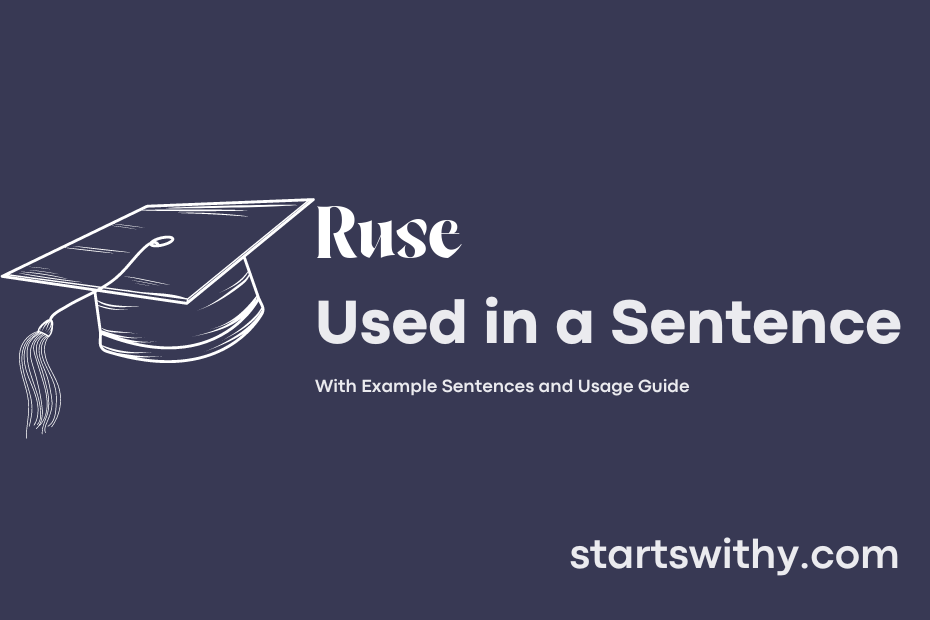Have you ever encountered a clever tactic or deception designed to mislead or trick someone? This is known as a “ruse.” A ruse is a cunning plan or strategy employed to deceive others for personal gain or an advantage.
Individuals might use a ruse to achieve their goals without revealing their true intentions. These deceptive techniques can range from simple tricks to complex, intricate schemes. Let’s explore some common examples of sentences incorporating the word “ruse.”
7 Examples Of Ruse Used In a Sentence For Kids
- I have a ruse to surprise my friend on her birthday.
- The fox used a ruse to trick the crow into dropping the cheese.
- Our teacher used a ruse to make learning math fun for us.
- The magician’s ruse amazed the audience at the show.
- The squirrel had a clever ruse to hide its acorns from other animals.
- The cat used a sneaky ruse to catch the mouse.
- We need to think of a creative ruse to win the game.
14 Sentences with Ruse Examples
- Many students tried to use a ruse to extend their assignment deadlines.
- Some students employed a ruse to skip attending boring lectures.
- The group came up with a ruse to sneak into the restricted section of the library.
- He used a ruse to impress his crush during college fest.
- There was a ruse to get free food at the canteen during college events.
- A student pulled off a ruse to avoid paying for photocopies at the library.
- The debate team used a clever ruse to win the inter-college competition.
- A ruse was used to get preferred seats during movie screenings on campus.
- She devised a brilliant ruse to get out of a group project she didn’t want to work on.
- Some students tried to use a ruse to avoid getting caught for cheating during exams.
- There was a ruse to score extra marks in the internal assessments.
- The seniors played a ruse on the juniors during the college orientation.
- The student council used a ruse to increase attendance at college events.
- A clever ruse helped some students get discounts at the college bookstore.
How To Use Ruse in Sentences?
Ruse is a noun that refers to a deceptive maneuver or tactic used to trick someone into believing something that is not true. When using ruse in a sentence, it is important to consider the context in which it is being employed.
For example, you could say, “She used a clever ruse to distract the guards while she snuck past them.” In this sentence, ruse is used to describe the deceptive tactic employed by “she” to deceive the guards.
Additionally, ruse can also be used in a more general sense to describe any type of deceitful or cunning behavior. For instance, you could say, “His friendly demeanor was just a ruse to gain their trust and access to confidential information.”
When incorporating ruse into your writing or speech, it is important to ensure that the sentence is clear and that the meaning of the word is understood by the reader or listener. Consider providing context or examples to clarify the intended meaning of ruse in your sentence.
In summary, remember that ruse is a noun that describes a deceptive maneuver or tactic. Use it thoughtfully in your writing to add depth and nuance to your communication.
Conclusion
In conclusion, the use of ruse in various contexts showcases its versatile nature in language. Whether employed in stories to deceive characters, in political strategies to manipulate perception, or in everyday scenarios to achieve a desired outcome, ruse is a powerful tool that can be used for both good and questionable purposes. While some may view ruses as clever tactics, others may see them as misleading or dishonest methods to achieve an end goal.
Regardless of the perspective, the examples highlighted demonstrate the intricate ways in which ruse can be woven into sentences to create intrigue, drama, or manipulation. Understanding the impact and implications of using ruse in communication is crucial in discerning its true intent and effect in shaping narratives and interactions.



